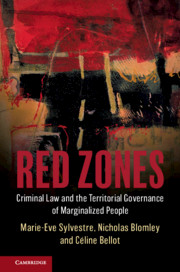Crossref Citations
This Book has been
cited by the following publications. This list is generated based on data provided by Crossref.
Blomley, Nicholas
Flynn, Alexandra
and
Sylvestre, Marie-Eve
2020.
Governing the Belongings of the Precariously Housed: A Critical Legal Geography.
Annual Review of Law and Social Science,
Vol. 16,
Issue. 1,
p.
165.
Roy12, Laurence
Leclair, Marichelle C.
Côté, Michelle
and
Crocker, Anne G.
2020.
Itinérance, santé mentale, justice.
Criminologie,
Vol. 53,
Issue. 2,
p.
359.
Manikis, Marie
and
De Santi, Jess
2020.
Punishment and Retribution Within the Bail Process: An Analysis of the Public Confidence in the Administration of Justice Ground for Pre-Trial Detention.
Canadian Journal of Law and Society / Revue Canadienne Droit et Société,
Vol. 35,
Issue. 3,
p.
413.
Taylor, Nicholas
Coomber, Kerri
Zahnow, Renee
Ferris, Jason
Mayshak, Richelle
and
Miller, Peter G.
2021.
The prospective impact of 10‐day patron bans on crime in Queensland's largest entertainment precincts.
Drug and Alcohol Review,
Vol. 40,
Issue. 5,
p.
771.
Scherer, Jay
Davidson, Judy
Kafara, Rylan
and
Koch, Jordan
2021.
Negotiating the New Urban Sporting Territory: Policing, Settler Colonialism, and Edmonton’s Ice District.
Sociology of Sport Journal,
Vol. 38,
Issue. 2,
p.
111.
Super, Gail
and
Ballesteros-Pena, Ana
2022.
Violence and bordering on the margins of the State: A view from South Africa and the southern border of Spain.
Theoretical Criminology,
Vol. 26,
Issue. 4,
p.
580.
Rush, Peter D.
2022.
A Sense of Place with Landmark Judgments: Anthropogenic Justice, Wildlife Extinction, and Climate Change.
Asian Journal of Law and Society,
Vol. 9,
Issue. 2,
p.
228.
Asoni, Ettore
2022.
Reassessing the camp/prison dichotomy: New directions in geographic research on confinement.
Progress in Human Geography,
Vol. 46,
Issue. 6,
p.
1349.
Leclair, Marichelle
Latimer, Éric
Lemieux, Ashley
Roy, Laurence
Nicholls, Tonia
and
Crocker, Anne G.
2022.
Au-delà du logement : l’effet hétérogène de Logement d’abord sur l’implication criminelle de personnes vivant avec un trouble mental.
Santé mentale au Québec,
Vol. 47,
Issue. 1,
p.
37.
Lesage‐Mann, Élaine
and
Apparicio, Philippe
2023.
La mobilité forcée des personnes utilisatrices de drogue par injection et inhalation en situation d'itinérance à Montréal.
Canadian Geographies / Géographies canadiennes,
Vol. 67,
Issue. 2,
p.
237.
Farmer, Clare
Miller, Peter G.
Taylor, Nicholas
and
Baldwin, Ryan
2023.
Do patron bans affect subsequent behaviour? An examination of pre‐ and post‐ban offending for barring notice and prohibition order recipients in Western Australia.
Drug and Alcohol Review,
Vol. 42,
Issue. 4,
p.
892.
Singh Kelsall, Tyson
Seaby Palmour, Jake
Marck, Rory
Withers, A. J.
Luongo, Nicole
Salem, Kahlied
Sutherland, Cassie
Veark, Jasmine
Patrick, Lyana
Bailey, Aaron
Boyd, Jade
Lawrence, Q.
Fleury, Mathew
Govorchin, Alya
Crompton, Nathan
Vance, Chris
Edwards, Blake
Swaich, Anmol
Kelsall, Amber
Mannoe, Meenakshi
Larlee, Portia
and
McDermid, Jenn
2023.
Situating the Nonprofit Industrial Complex.
Social Sciences,
Vol. 12,
Issue. 10,
p.
549.
Bernheim, Emmanuelle
and
Gauthier-Boiteau, Delphine
2023.
Expériences judiciaires et accès à la justice des familles en protection de la jeunesse.
Nouvelles pratiques sociales,
Vol. 33,
Issue. 2,
p.
94.
Martino, Natasha
Sanders, C. B.
and
Dej, E.
2024.
The ‘regulatory grey zone’: bylaw enforcement’s governing of homelessness and space.
Policing and Society,
Vol. 34,
Issue. 4,
p.
305.
Moiseeva, Ekaterina (Katya)
2024.
The Logic of NIMBYism: Class, Race, and Stigma in the Making of California’s Legal Cannabis Market.
Law & Social Inquiry,
Vol. 49,
Issue. 2,
p.
1107.
Lundberg, Kajsa
Popovski, Hristijan
and
Young, Alison
2024.
Spatial Governance of the Unhoused: On Social Death in the Contemporary City.
Social & Legal Studies,
McClelland, Alexander
Brophy, Jason
King, Alexandra
Owino, Maureen
Wah, Amy
and
Peck, Ryan
2024.
Action needed to address molecular HIV surveillance ethical concerns.
Canadian Journal of Public Health,
Bernheim, Emmanuelle
2024.
Profilage et violence judiciaire : la multijudiciarisation civile et administrative en santé mentale à l’intersection de la classe sociale, du genre et de la race.
Criminologie,
Vol. 57,
Issue. 1,
p.
45.
Michaud, Liam
van der Meulen, Emily
Chu, Sandra Ka Hon
and
Butler-McPhee, Janet
2024.
“The Law is too Grey”: Liminal Legality and Moral Injury in Encounters with Drug Law Enforcement.
Social & Legal Studies,
Brais, Hannah
and
Laniyonu, Ayobami
2024.
Shelter in place: neighborhood policing of homelessness in Montreal, Canada.
Urban Geography,
p.
1.



